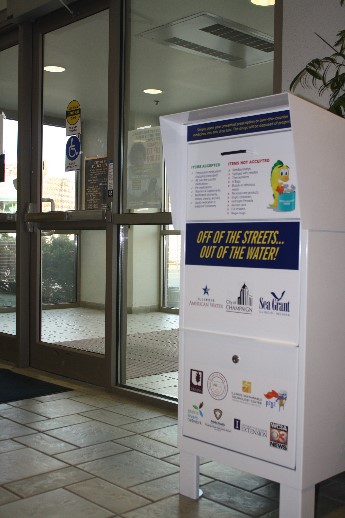Drugs
 Many people are now aware that they shouldn’t flush unwanted drugs down the toilet because those chemicals end up in waterways and pollute the environment. So what is the correct way to dispose of unwanted medicine?
Many people are now aware that they shouldn’t flush unwanted drugs down the toilet because those chemicals end up in waterways and pollute the environment. So what is the correct way to dispose of unwanted medicine?
 The U.S. EPA recommends that unwanted drugs including prescriptions, over-the-counter, and pet medicines be disposed of though a one-day or permanent take-back program. These take-back programs are typically at local police stations or pharmacies. If and only if it is absolutely not feasible to take the unwanted drugs to a collection site, then the medicines should be mixed with kitty litter or coffee grounds, sealed in a water proof container, and placed in the trash. These safe disposal methods also reduce incidences of accidental poisonings in children, elderly, and pets and reduce drug abuse.
The U.S. EPA recommends that unwanted drugs including prescriptions, over-the-counter, and pet medicines be disposed of though a one-day or permanent take-back program. These take-back programs are typically at local police stations or pharmacies. If and only if it is absolutely not feasible to take the unwanted drugs to a collection site, then the medicines should be mixed with kitty litter or coffee grounds, sealed in a water proof container, and placed in the trash. These safe disposal methods also reduce incidences of accidental poisonings in children, elderly, and pets and reduce drug abuse.
Sharps
 While the majority of drugs are taken by pill, some require injection which leaves behind needles and syringes, called sharps. Sharps have special disposal requirements because once they have touched a person’s blood they are then considered biohazardous materials and can be vectors for the spread of certain diseases. Because of this risk, sharps are not allowed in household recycling bins or in the take-back program bins or at household hazardous waste collection sites. Residents are allowed to place sharps in ridged plastic containers sealed with duct tape with the words “do not recycle” on the outside and then place the containers into the trash. But this method is not the safest for the environment or for landfill employees. The best method recommended by the U.S. EPA is to find a sharps collection site (typically at hospitals) or use a mail-back program.
While the majority of drugs are taken by pill, some require injection which leaves behind needles and syringes, called sharps. Sharps have special disposal requirements because once they have touched a person’s blood they are then considered biohazardous materials and can be vectors for the spread of certain diseases. Because of this risk, sharps are not allowed in household recycling bins or in the take-back program bins or at household hazardous waste collection sites. Residents are allowed to place sharps in ridged plastic containers sealed with duct tape with the words “do not recycle” on the outside and then place the containers into the trash. But this method is not the safest for the environment or for landfill employees. The best method recommended by the U.S. EPA is to find a sharps collection site (typically at hospitals) or use a mail-back program.
 Once the drugs and sharps are collected by their designated collectors, they are securely transported to a special medical incinerator that is designed to handle these types of waste streams with specialized equipment to prevent environmental pollution.
Once the drugs and sharps are collected by their designated collectors, they are securely transported to a special medical incinerator that is designed to handle these types of waste streams with specialized equipment to prevent environmental pollution.
More Reading
- Illinois-Indiana Sea Grant: How to Dispose of Unwanted Medicine & Personal Care Products
- IL EPA: Medicine Disposal
- IL EPA fact sheet (PDF): Safe Options for Home Needle Disposal

